- Home
- Connie Willis
Jack Page 3
Jack Read online
Page 3
The pantry door opened and Nelson and Mrs Lucy came out, Nelson still holding the unfolded paper. She was still wearing her tea-party smile, but it was a bit thin. “I’m sure you can see it’s unrealistic to expect nine people to huddle in a coal cellar for hours at a time,” she said.
“There are people all over London ‘huddling in coal cellars for hours at a time’, as you put it,” Nelson said coldly, “who do not wish their Civil Defence funds spent on frivolities.”
“I do not consider the safety of my wardens a frivolity,” she said, “though it is clear to me that you do, as witnessed by your very poor record.”
Nelson stared for a full minute at Mrs Lucy, trying to think of a retort, and then turned on me. “Your uniform is a disgrace, warden,” he said and stomped out.
Whatever it was Jack had used to find Colonel Godalming, it didn’t work on incendiaries. He searched as haphazardly for them as the rest of us, Vi, who had been on spotter duty, shouting directions: “No, further down Fulham Road. In the grocer’s.”
She had apparently been daydreaming about her pilots, instead of spotting. The incendiary was not in the grocer’s but in the butcher’s three doors down, and by the time Jack and I got to it, the meat locker was on fire. It wasn’t hard to put out, there were no furniture or curtains to catch and the cold kept the wooden shelves from catching, but the butcher was extravagantly grateful. He insisted on wrapping up five pounds of lamb chops in white paper and thrusting them into Jack’s arms.
“Did you really have to be at your day job so early or were you only trying to escape the colonel?” I asked Jack on the way back to the post.
“Was he that bad?” he said, handing me the parcel of lamb chops.
“He nearly took my head off when I said you’d heard him shouting. Said he didn’t call for help. Said he was digging himself out.” The white butcher’s paper was so bright the Luftwaffe would think it was a searchlight. I tucked the parcel inside my overalls so it wouldn’t show. “What sort of work is it, your day job?” I asked.
“War work,” he said.
“Did they transfer you? Is that why you came to London?”
“No,” he said. “I wanted to come.” We turned into Mrs Lucy’s street. “Why did you join the ARP?”
“I’m waiting to be called up,” I said, “so no one would hire me.”
“And you wanted to do your bit.”
“Yes,” I said, wishing I could see his face.
“What about Mrs Lucy? Why did she become a warden?”
“Mrs Lucy?” I said blankly. The question had never even occurred to me. She was the best warden in London. It was her natural calling, and I’d thought of her as always having been one. “I’ve no idea,” I said. “It’s her house, she’s a widow. Perhaps the Civil Defence commandeered it, and she had to become one. It’s the tallest in the street.” I treid to remember what Twickenham had written about her in his interview. “Before the war she was something to do with a church.”
“A church,” he said, and I wished again I could see his face. I couldn’t tell in the dark whether he spoke in contempt or longing.
“She was a deaconess or something,” I said. “What sort of war work is it? Munitions?”
“No,” he said and walked on ahead.
Mrs Lucy met us at the door of the post. I gave her the package of lamb chops, and Jack went upstairs to replace Vi as spotter. Mrs Lucy cooked the chops up immediately, running upstairs to the kitchen during a lull in the raids for salt and a jar of mint sauce, standing over the gas ring at the end of the table and turning them for what seemed an eternity. They smelled wonderful.
Twickenham passed round newly run-off copies of Twickenham’s Twitterings. “Something for you to read while you wait for your dinner,” he said proudly.
The lead article was about the change in address of Sub-Post D, which had taken a partial hit that broke the water mains.
“Had Nelson refused them reinforcements, too?” Swales asked.
“Listen to this,” Petersby said. He read aloud from the news-sheet. “ ‘The crime rate in London has risen 28 per cent since the beginning of the blackout.’ ”
“And no wonder,” Vi said, coming down from upstairs. “You can’t see your nose in front of your face at night, let alone someone lurking in an alley. I’m always afraid someone’s going to jump out at me while I’m on patrol.”
“All those houses standing empty, and half of London sleeping in the shelters,” Swales said. “It’s easy pickings. If I was a bad’un, I’d come straight to London.”
“It’s disgusting,” Morris said indignantly. “The idea of someone taking advantage of there being a war like that to commit crimes.”
“Oh, Mr Morris, that reminds me. Your son telephoned,” Mrs Lucy said, cutting into a chop to see if it was done. Blood welled up. “He said he’d a surprise for you, and you were to come out to” — she switched the fork to her left hand and rummaged in her overall pocket till she found a slip of paper — “North Weald on Monday, I think. His commanding officer’s made the necessary travel arrangements for you. I wrote it all down.” She handed it to him and went back to turning the chops.
“A surprise?” Morris said, sounding worried. “He’s not in trouble, is he? His commanding officer wants to see me?”
“I don’t know. He didn’t say what it was about. Only that he wanted you to come.”
Vi went over to Mrs Lucy and peered into the skillet. “I’m glad it was the butcher’s and not the grocer’s,” she said. “Rutabagas wouldn’t have cooked up half so nice.”
Mrs Lucy speared a chop, put it on a plate, and handed it to Vi. “Take this up to Jack,” she said.
“He doesn’t want any,” Vi said. She took the plate and sat down at the table.
“Did he say why he didn’t?” I asked.
She looked curiously at me. “I suppose he’s not hungry,” she said. “Or perhaps he doesn’t like lamb chops.”
“I do hope he’s not in any trouble,” Morris said, and it took me a minute to realize he was talking about his son. “He’s not a bad boy, but he does things without thinking. Youthful high spirits, that’s all it is.”
“He didn’t eat the cake either,” I said. “Did he say why he didn’t want the lamb chop?”
“If Mr Settle doesn’t want it, then take it to Mr Renfrew,” Mrs Lucy said sharply. She snatched the plate away from Vi. “And don’t let him tell you he’s not hungry. He must eat. He’s getting very run-down.”
Vi sighed and stood up. Mrs Lucy handed her back the plate and she went into the other room.
“We all need to eat plenty of good food and get lots of sleep,” Mrs Lucy said reprovingly. “To keep our strength up.”
“I’ve written an article about it in the Twitterings” Twickenham said, beaming. “It’s known as ‘walking death’. It’s brought about by lack of sleep and poor nutrition, with the anxiety of the raids. The walking dead exhibit slowed reaction time and impaired judgment which result in increased accidents on the job.”
“Well, I won’t have any walking dead among my wardens,” Mrs Lucy said, dishing up the rest of the chops. “As soon as you’ve had these, I want you all to go to bed.”
The chops tasted even better than they had smelled. I ate mine, reading Twickenham’s article on the walking dead. It said that loss of appetite was a common reaction to the raids. It also said that lack of sleep could cause compulsive behaviour and odd fixations. “The walking dead may become convinced that they are being poisoned or that a friend or relative is a German agent. They may hallucinate, hearing voices, seeing visions or believing fantastical things.”
“He was in trouble at school, before the war, but he’s steadied down since he joined up,” Morris said. “I wonder what he’s done.”
At three the next morning a land-mine exploded in almost the same spot off Old Church Street as the HEs. Nelson sent Olmwood to ask for help, and Mrs Lucy ordered Swales, Jack and me to go with him.
“I know what they’re aiming at,” Renfrew said from the doorway. He looked terrible, pale and drawn as a ghost. “And I know why you’ve applied for reinforcements for the post. It’s me, isn’t it? They’re after me.”
“They’re not after any of us,” Mrs Lucy said firmly. “They’re two miles up. They’re not aiming at anything.”
“Why would Hitler want to bomb you more than the rest of us?” Swales said.
“I don’t know.” He sank down on one of the chairs and put his head in his hands. “I don’t know. But they’re after me. I can feel it.”
Mrs Lucy had sent Swales, Jack and me to the incident because “you’ve been there before. You’ll know the terrain,” but that was a fond hope. Since they explode above ground, landmines do considerably more damage than HEs. There was now a hill where the incident officer’s tent had been, and three more beyond it, a mountain range in the middle of London. Swales started up the nearest peak to look for the incident officer’s light.
“Jack, over here!” somebody called from the hill behind us, and both of us scrambled up a slope towards the voice.
A group of five men were halfway up the hill looking down into a hole.
“Jack!” the man yelled again. He was wearing a blue foreman’s armband, and he was looking straight past us at someone toiling up the slope with what looked like a stirrup pump. I thought, surely they’re not trying to fight a fire down that shaft, and then saw it wasn’t a pump. It was, in fact, an automobile jack, and the man with the blue armband reached between us for it, lowered it down the hole, and scrambled in after it.
The rest of the rescue squad stood looking down into the blackness as if they could actually see something. After a while they began handing empty buckets down into the hole and pulling them out heaped full of broken bricks and pieces of splintered wood. None of them took any notice of us, even when Jack held out his hands to take one of the buckets.
“We’re from Chelsea,” I shouted to the foreman over the din of the planes and bombs. “What can we do to help?”
They went on bucket-brigading. A china teapot came up on the top of one load, covered with dust but not even chipped.
I tried again. “Who is it down there?”
“Two of ’em,” the man nearest me said. He plucked the teapot off the heap and handed it to a man wearing a balaclava under his helmet. “Man and a woman.”
“We’re from Chelsea,” I shouted over a burst of anti-aircraft fire. “What do you want us to do?”
He took the teapot away from the man with the balaclava and handed it to me. “Take this down to the pavement with the other valuables.”
It took me a long while to get down the slope, holding the teapot in one hand and the lid on with the other and trying to keep my footing among the broken bricks, and even longer to find any pavement. The land-mine had heaved most of it up, and the street with it.
I finally found it, a square of unbroken pavement in front of a blown-out bakery, with the “valuables” neatly lined up against it: a radio, a boot, two serving spoons like the one Colonel Godalming had threatened me with, a lady’s beaded evening bag. A rescue worker was standing guard next to them.
“Halt!” he said, stepping in front of them as I came up, holding a pocket torch or a gun. “No one’s allowed inside the incident perimeter.”
“I’m ARP,” I said hastily. “Jack Harker. Chelsea.” I held up the teapot. “They sent me down with this.”
It was a torch. He flicked it on and off, an eyeblink. “Sorry,” he said. “We’ve had a good deal of looting recently.” He took the teapot and placed it at the end of the line next to the evening bag. “Caught a man last week going through the pockets of the bodies laid out in the street waiting for the mortuary van. Terrible how some people will take advantage of something like this.”
I went back up to where the rescue workers were digging. Jack was at the mouth of the shaft, hauling buckets up and handing them back. I got in line behind him.
“Have they found them yet?” I asked him as soon as there was a lull in the bombing.
“Quiet!” a voice shouted from the hole, and the man in the balaclava repeated, “Quiet, everyone! We must have absolute quiet!”
Everyone stopped working and listened. Jack had handed me a bucket full of bricks, and the handle cut into my hands. For a second there was absolute silence, and then the drone of a plane and the distant swish and crump of an HE.
“Don’t worry,” the voice from the hole shouted, “we’re nearly there.” The buckets began coming up out of the hole again.
I hadn’t heard anything, but apparently down in the shaft they had, a voice or the sound of tapping, and I felt relieved, both that one of them at least was still alive, and that the diggers were on course. I’d been on an incident in October where we’d had to stop halfway down and sink a new shaft because the rubble kept distorting and displacing the sound. Even if the shaft was directly above the victim, it tended to go crooked in working past obstacles, and the only way to keep it straight was with frequent soundings. I thought of Jack digging for Colonel Godalming with the banister. He hadn’t taken any soundings at all. He had seemed to know exactly where he was going.
The men in the shaft called for the jack again, and Jack and I lowered it down to them. As the man below it reached up to take it, Jack stopped. He raised his head, as if he were listening.
“What is it?” I said. I couldn’t hear anything but the ack-ack guns in Hyde Park. “Did you hear someone calling?”
“Where’s the bloody jack?” the foreman shouted.
“It’s too late,” Jack said to me. “They’re dead.”
“Come along, get it down here,” the foreman shouted. “We haven’t got all day.”
He handed the jack down.
“Quiet,” the foreman shouted, and above us, like a ghostly echo, we could hear the balaclava call, “Quiet, please, everyone.”
A church clock began to chime and I could hear the balaclava say irritatedly, “We must have absolute quiet.”
The clock chimed four and stopped, and there was a skittering sound of dirt falling on metal. Then silence, and a faint sound.
“Quiet!” the foreman called again, and there was another silence, and the sound again. A whimper. Or a moan. “We hear you,” he shouted. “Don’t be afraid.”
“One of them’s still alive,” I said.
Jack didn’t say anything.
“We just heard them,” I said angrily.
Jack shook his head.
“We’ll need lumber for bracing,” the man in the balaclava said to Jack, and I expected him to tell him it was no use, but he went off immediately and came back dragging a white-painted bookcase.
It still had three books in it. I helped Jack and the balaclava knock the shelves out of the case and then took the books down to the store of “valuables”. The guard was sitting on the pavement going through the beaded evening bag.
“Taking inventory,” he said, scrambling up hastily. He jammed a lipstick and a handkerchief into the bag. “So’s to make certain nothing gets stolen.”
“I’ve brought you something to read,” I said, and laid the books next to the teapot. “Crime and Punishment.”
I toiled back up the hill and helped Jack lover the bookshelves down the shaft and after a few minutes buckets began coming up again. We reformed our scraggly bucket brigade, the balaclava at the head of it and me and then Jack at its end.
The all-clear went. As soon as it wound down, the foreman took another sounding. This time we didn’t hear anything, and when the buckets started again I handed them to Jack without looking at him.
It began to get light in the east, a slow greying of the hills above us. Two of them, several storeys high, stood where the row of houses that
had escaped the night before had been, and we were still in their shadow, though I could see the shaft now, with the end of one of the white bookshelves sticking up from it like a gravestone.
The buckets began to come more slowly.
“Put out your cigarettes!” the foreman called up, and we all stopped, trying to catch the smell of gas. If they were dead, as Jack had said, it was most likely gas leaking in from the broken mains that had killed them, and not internal injuries. The week before we had brought up a boy and his dog, not a scratch on them. The dog had barked and whimpered almost up to when we found them, and the ambulance driver said she thought they’d only been dead a few minutes.
I couldn’t smell any gas and after a minute the foreman said excitedly, “I see them!”
The balaclava leaned over the shaft, his hands on his knees. “Are they alive?”
“Yes! Fetch an ambulance!”
The balaclava went leaping down the hill, skidding on broken bricks that skittered down in a minor avalanche.
I knelt over the shaft. “Will they need a stretcher?” I called down.
“No,” the foreman said, and I knew by the sound of his voice they were dead.
“Both of them?” I said.
“Yes.”
I stood up. “How did you know they were dead?” I said, turning to look at Jack. “How did—”
He wasn’t there. I looked down the hill. The balaclava was nearly to the bottom— grabbing at a broken window sash to stop his headlong descent, his wake a smoky cloud of brick dust—but Jack was nowhere to be seen.
It was nearly dawn. I could see the grey hills and at the far end of them the warden and his “valuables”. There was another rescue party on the third hill over, still digging. I could see Swales handing down a bucket.
“Give a hand here,” the foreman said impatiently and hoisted the jack up to me. I hauled it over to the side and then came back and helped the foreman out of the shaft. His hands were filthy, covered in reddish-brown mud.

 Passage
Passage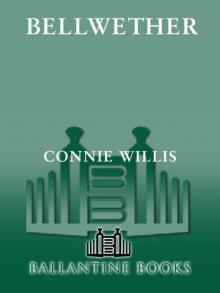 Bellwether
Bellwether Blackout
Blackout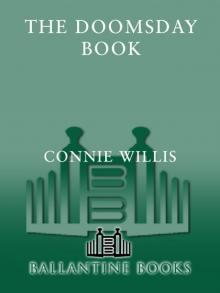 Doomsday Book
Doomsday Book A Lot Like Christmas: Stories
A Lot Like Christmas: Stories Water Witch
Water Witch To Say Nothing of the Dog
To Say Nothing of the Dog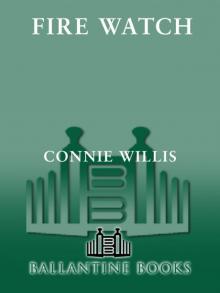 Fire Watch
Fire Watch The Winds of Marble Arch and Other Stories
The Winds of Marble Arch and Other Stories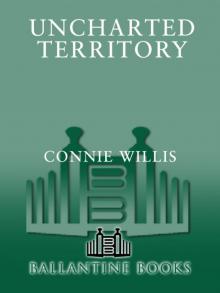 Uncharted Territory
Uncharted Territory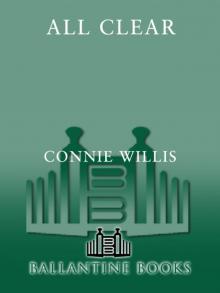 All Clear
All Clear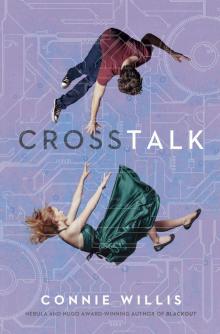 Crosstalk
Crosstalk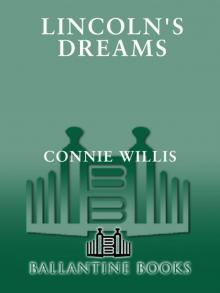 Lincoln's Dreams
Lincoln's Dreams Miracle and Other Christmas Stories
Miracle and Other Christmas Stories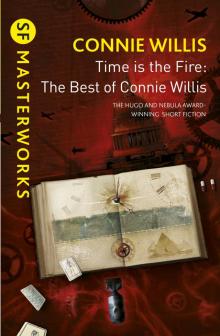 Time is the Fire
Time is the Fire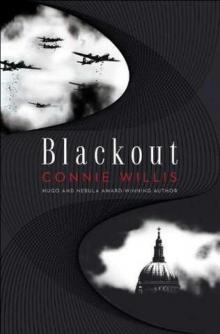 Blackout ac-1
Blackout ac-1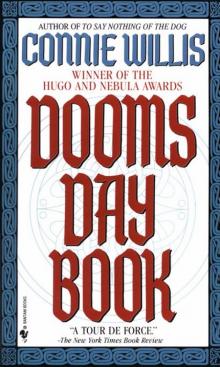 Dooms Day Book
Dooms Day Book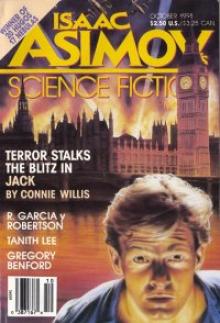 Jack
Jack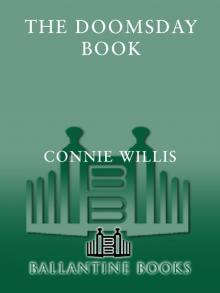 The Doomsday Book
The Doomsday Book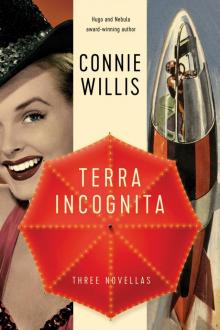 Terra Incognita
Terra Incognita The Best of Connie Willis
The Best of Connie Willis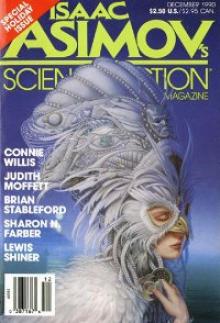 Cibola
Cibola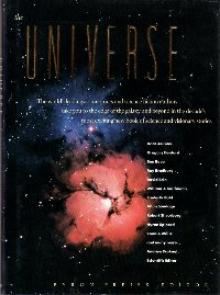 Schwarzschild Radius
Schwarzschild Radius Even the Queen
Even the Queen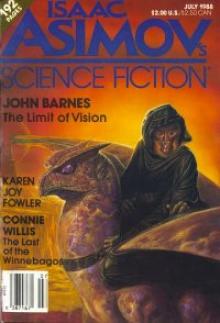 The Last of the Winnebagos
The Last of the Winnebagos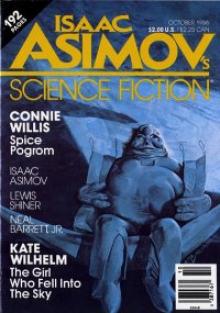 Spice Pogrom
Spice Pogrom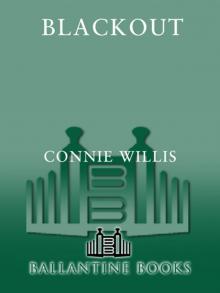 Oxford Time Travel 1 - Blackout
Oxford Time Travel 1 - Blackout At The Rialto
At The Rialto A Lot Like Christmas
A Lot Like Christmas